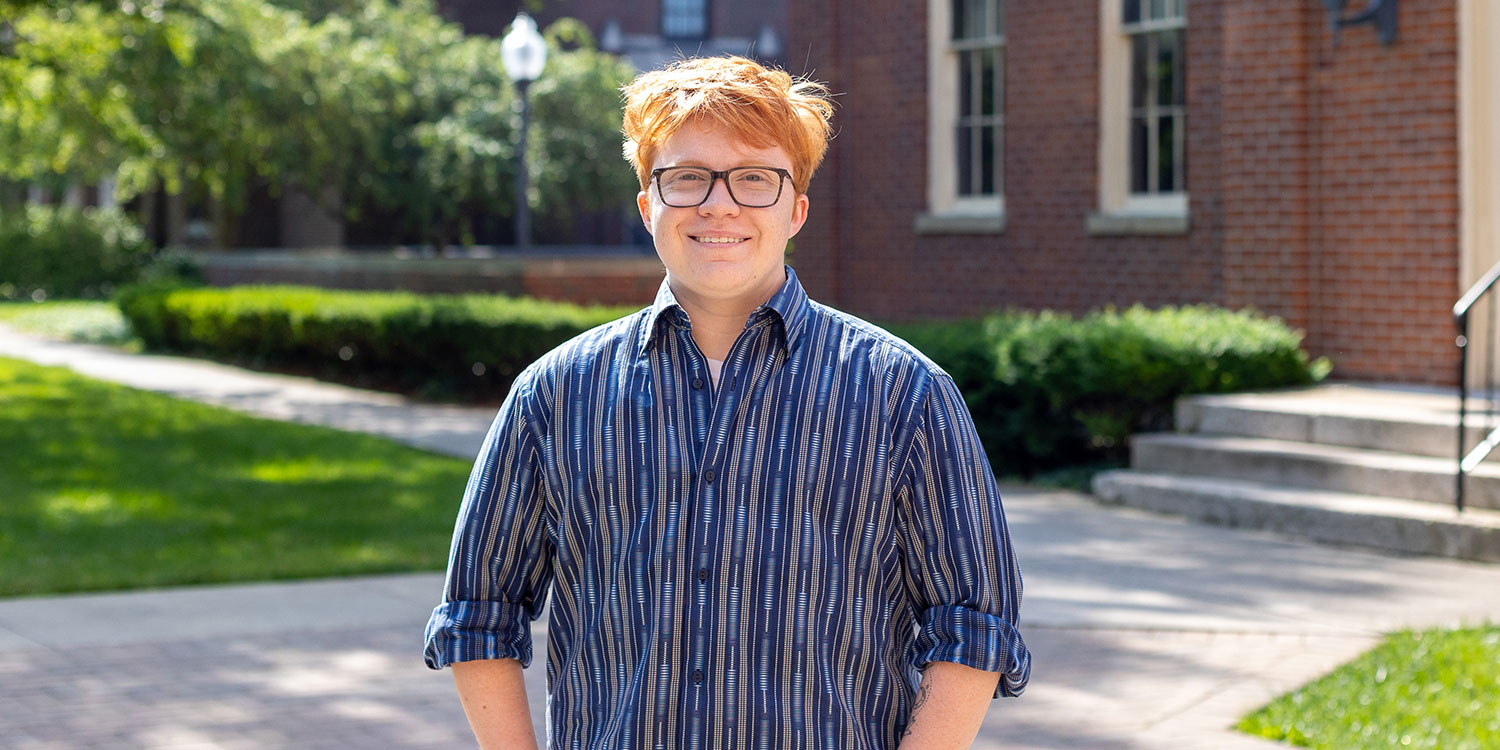When Leo Franck ’26, history major, walked into a workshop at the Anne Frank International Youth Network Conference this summer, he didn’t expect to see his research come to life. Surrounded by peers from around the world, he was asked to rank fundamental human rights in order of importance. The debate was spirited, reflecting each country’s struggles and priorities. But when it came to the very first right, every group agreed: All human beings are born free and equal in dignity and rights.
For Franck, who had just spent months immersed in archives studying how the Holocaust and First Lady Eleanor Roosevelt shaped the creation of the Universal Declaration of Human Rights (UDHR), the moment was electric.
“The United Nations was created during World War II and then it became an official entity afterwards. The prompt they were tasked with was an International Bill of Rights,” said Franck. “After two years of work, it became the UDHR. It’s very important to note that it isn’t necessarily binding law. International law gets very murky. Something I’ve learned is that international law isn’t as real as I thought it was. It’s an agreement of things we aspire to be. This is what we think a world of peace and prosperity and acting in kindness with our fellow man will look like.”
Through Capital’s Summer Scholars program, Franck immersed himself in research for his project, Eleanor and the Survivors: The Holocaust and the Creation of the Universal Declaration of Human Rights. He examined the pivotal role of Eleanor Roosevelt and other delegates who shaped one of the world’s most important human rights documents.
He was encouraged to look into the UDHR and Roosevelt’s work as chair of the United Nations Human Rights Commission.
“She wrote a six-day-a-week newspaper column in a women’s magazine. Looking at those primary sources, her speeches, the more I wanted to know what shaped her vision,” Franck said. “One of her responsibilities on the committee, as part of the U.S. delegation to the United Nations, was to go to the displaced persons campus where refugees were. She interacted with survivors directly, and I wanted to know how those experiences influenced her work.”
With guidance from his mentor, Dr. Alexander Pantsov, professor of history, Franck deepened his focus. He explored Roosevelt’s role but also broadened his scope to other key delegates, such as French jurist René Cassin, who lost 21 relatives in the Holocaust and became a leading architect of the UDHR. His research revealed that for many drafters, the atrocities of war were never far from their minds.
“The UDHR is the world’s response to fascism, to Nazism,” Franck explained. “It is a complete rebuke of the horrors of World War II and an agreement by the world to be better.”
The project demanded more than library study. Franck corresponded with the Franklin D. Roosevelt Presidential Library, combed through United Nations records, and spent weeks navigating contentious scholarly debates.
“Every time I thought I had reached a conclusion, I’d read something new that challenged me to rethink it,” he said. “[The Roosevelts] were such towering figures in American history and in the lives of people around them, they changed the course not just of history, but of so many individuals’ lives just by being in proximity. They were all such fascinating people.”
Yet the most transformative moment of Franck’s summer came not in the archives, but at the Anne Frank International Youth Network Conference in Columbia, South Carolina. Capital students were invited to apply after hosting a traveling Anne Frank House exhibit on campus, and Franck seized the chance to join young people from around the world in discussing democracy and human rights.
At one workshop, participants were asked to rank fundamental rights in order of importance. Franck’s group included students from the U.S., Poland, and Panama.
“We all had such different priorities based on what was happening in our countries,” he said. “But the one right everyone placed first was almost word-for-word from the UDHR: ‘All human beings are born free and equal in dignity and rights.’ That moment made the connection between my research and the real-world relevance of human rights.”
The exercise didn’t stop there. Students flipped their cards to reveal examples of when those rights had been violated. For Franck, it was a turning point.
“After months of analyzing these ideas on a scholarly level, seeing the human cost of their absence grounded everything,” he said. “It reminded me that these aren’t abstract principles. They affect people’s lives every day.”
As Franck refines his paper for conferences and potential publication, he carries that lesson forward.
“There have been several subsequent treaties, such as the Geneva Conventions, and then in the ’90s, after the collapse of the USSR, the Vienna Convention was signed and agreed upon, which kind of supersedes the UDHR,” Franck said.
“The UDHR is still considered by many scholars to be the foundational layer of the current human rights regime. And human rights regime here means the combination of international bodies like the International Court of Justice, sovereign states and governments agreeing to uphold those, and non-governmental entities that promote human rights and try to uplift people. The thing to remember is that all of these organizations, groups, and governments don’t always agree on what exactly upholding human rights means.”
With plans to present at national research conferences and hopefully share his findings on the Anne Frank Youth Network’s podcast, Franck is committed to keeping the conversation alive. His work stands as both a scholarly achievement and a testament to the enduring need for vigilance against injustice.
To learn more about History at Capital, visit https://www.capital.edu/academics/history.
